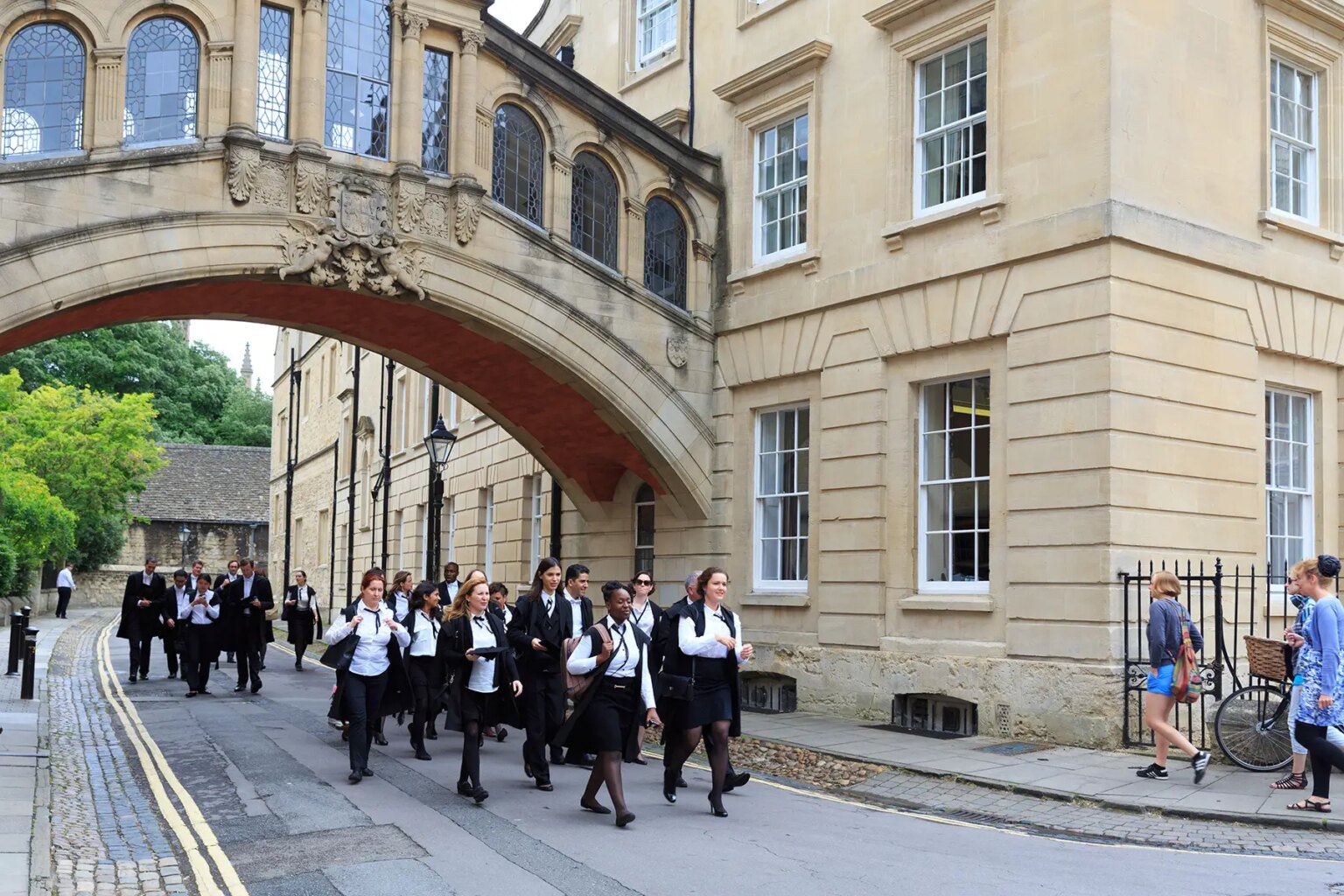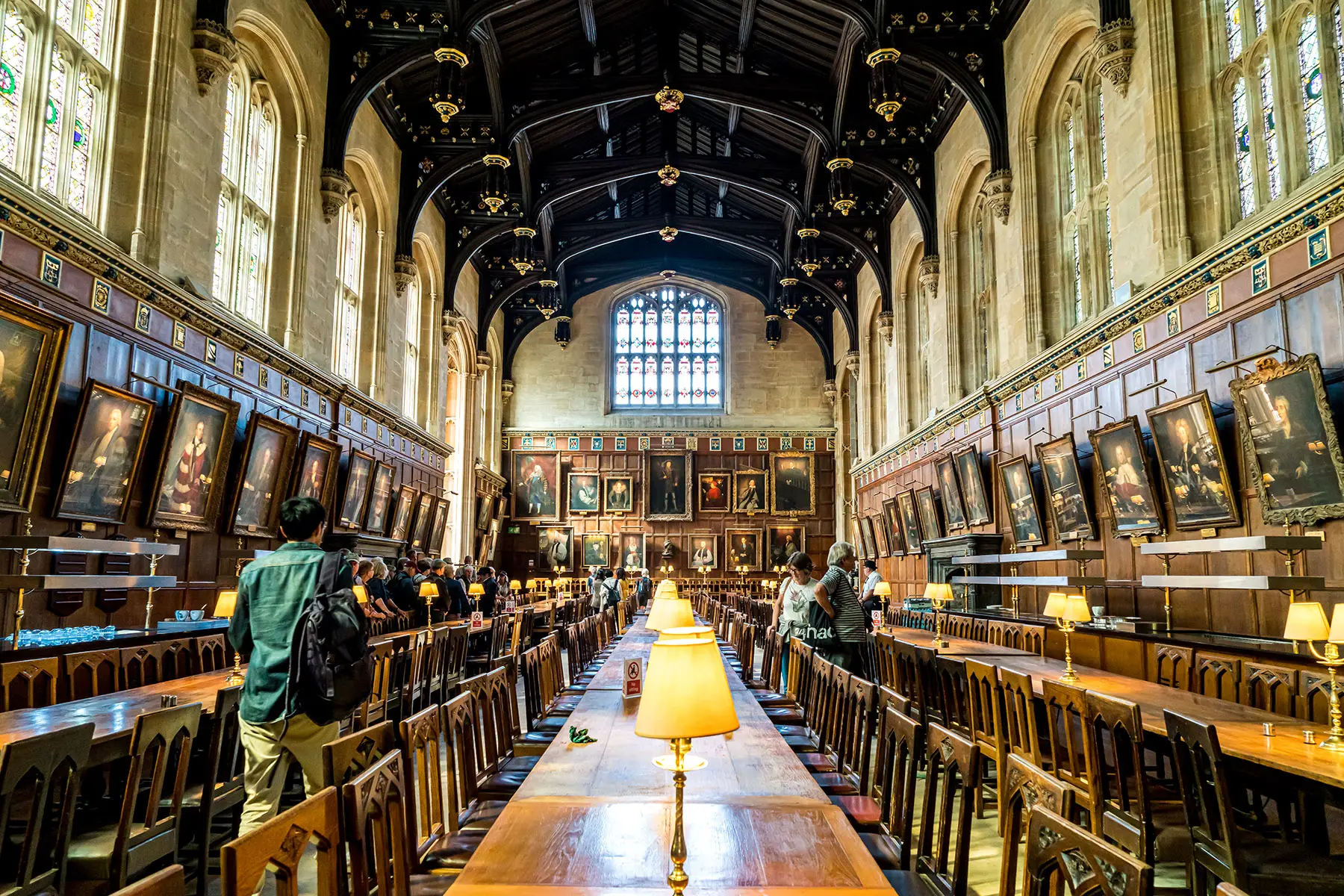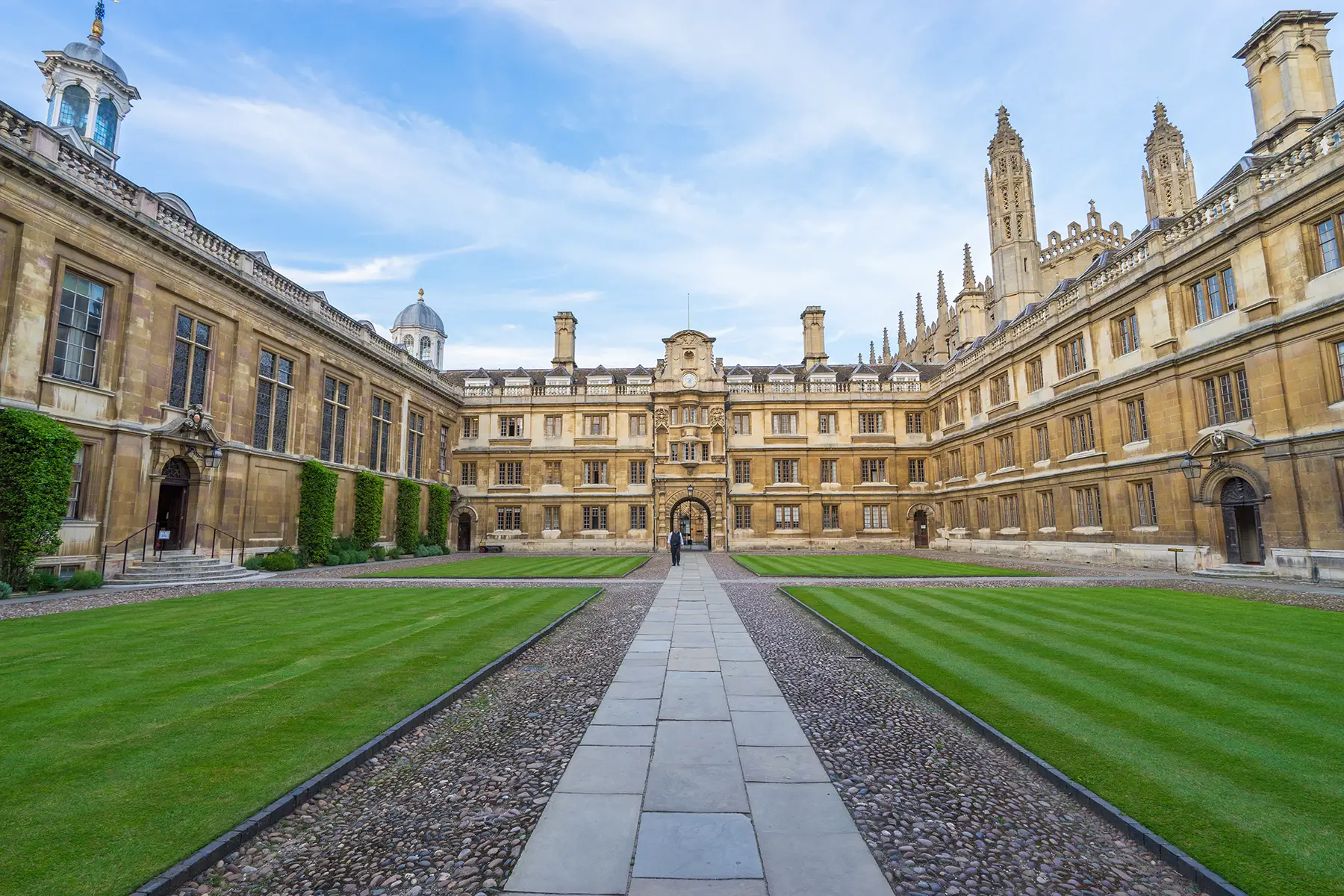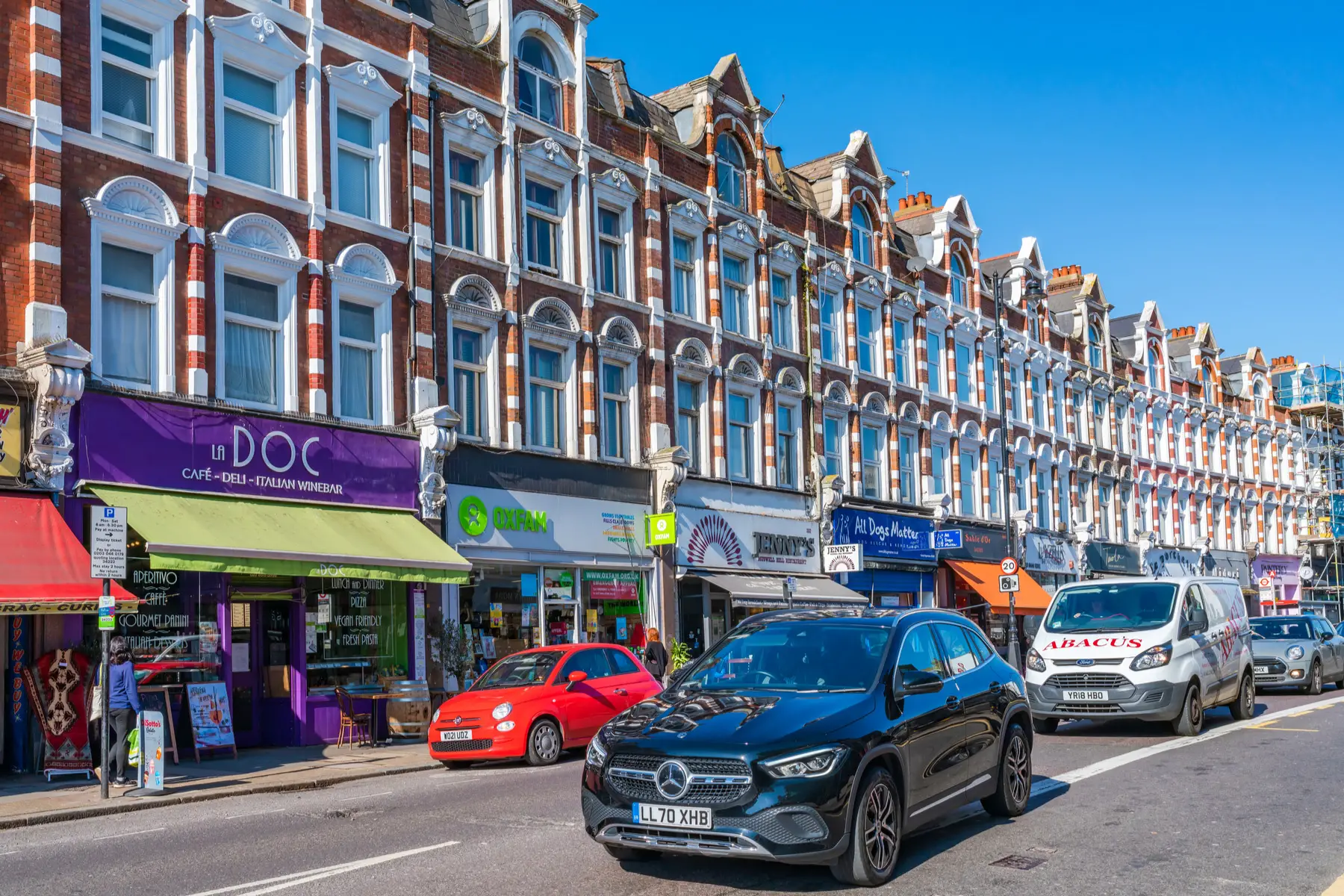The UK attracts more international students than any other country outside of the US. Although fees have risen and visa controls have tightened in recent years, it remains a popular option due to its top-quality universities, student culture in the big cities, and scholarships available for study.
If you’re considering coming to the UK for study purposes, find out all you need to know about:
- Higher education in the UK
- Degree programs in the UK
- Postgraduate programs in the UK
- Other study programs in the UK
- General requirements for studying in the UK
- Costs of studying in the UK
- Funding available for studying in the UK
- Study exchange programs in the UK
- Qualifications awarded in the UK
- How to apply to study in the UK
- Student housing in the UK
- Working while studying in the UK
- Volunteering while studying in the UK
- Student healthcare in the UK
- Student life in the UK
- After studying in the UK
- Useful resources
Higher education in the UK
The UK has one of the best higher education systems in the world, with 11 of its universities featuring in the top 100 in the 2022 Times Higher Education World University Rankings. Its reputation means that many international students come each year to study. In 2020/21, 584,100 overseas students arrived, making up 22% of the student body. Nearly one fifth of these were from China.
Higher education in the UK is split into graduate and postgraduate programs. These are distinct from further education courses studied at colleges, for example A-Levels, BTECs and NVQs. Students in the UK generally start higher education aged 18 after finishing their A-Levels. However, it’s possible to start later in life if you have A-Level qualifications or take an Access to Higher Education (Access to HE) course.

Universities in the UK
There are 295 universities and higher education institutions in the UK. They are all private in the sense that they are independent and not state-controlled. However, the majority receive government funding. There are both general and specialist universities split into four broad types:
- Ancient universities – these institutions were established between the 11th and 16th centuries. They include Oxford, Cambridge, and St Andrews.
- Red brick, or civic, universities – these universities were built in the early 20th century. The term ‘red brick’ originally referred to six universities including Sheffield, Birmingham, and Leeds.
- Plate glass universities – mostly built in the 1960s, these include Essex, Loughborough, and Bath.
- New universities – transformed from polytechnics and colleges in the 1980s and 90s. This category contains universities such as Derby, South Wales, and Sheffield Hallam.
If you move to the UK to study, you might also hear the term Russell Group. This refers to 24 leading research universities that fall into the above categories.
Term time in UK higher education usually runs from September to June. It is split into Christmas and Easter terms, or semesters, of around 10 weeks each, and a summer term where students usually take exams. In addition, semesters often have a reading week, during which there are no lectures or classes. Unless you are studying a foreign language, the language of instruction is English.
Each part of the UK – England, Wales, Scotland, and Northern Ireland – has its own education system. However, most of the key features do not differ significantly.
Degree programs in the UK
There are several different types of undergraduate degree programs in the UK. The most common are bachelor’s degrees, which usually take three full-time years to complete (four in Scotland). Undergraduate degrees in the UK are equivalent to level 4, 5, or 6 qualifications (9 or 10 in Scotland). They usually cover a reasonably broad area consisting of several topics within a main subject.
According to the Higher Education Statistics Agency, the most popular degree courses in the UK in 2021–2022 were:
- Business and management
- Medicine-related programs
- Social sciences
- Creative and performing arts
- Engineering
You can check out good places to study in the Complete University Guide UK league tables and search for subjects on the UCAS website.
Bachelor’s degrees
Bachelor’s degrees are level 6 qualifications (level 9 and 10 in Scotland) which include:
- BA – Bachelor of Arts
- BSc – Bachelor of Science
- BEd – Bachelor of Education
- BEng – Bachelor of Engineering
- LLB – Bachelor of Law
These degrees typically consist of either a single subject, such as journalism, or dual subjects, such as psychology and criminology. Sometimes, there may also be a third subject (for example, French, Russian, and Spanish). Degrees typically take three years to complete full-time (four in Scotland). To apply, most universities require that you have A-levels or an equivalent, such as an Access to HE diploma. Top universities usually ask for high grades, including good GCSE (secondary school) results.
UK students pay a maximum of £9,250 a year for bachelor’s degrees. International students pay between £10,000 and £20,000.
Foundation degrees
Foundation degrees (FdA/FdSc) are Level 5 qualifications equivalent to the first two years of a bachelor’s degree. They last for two years and generally consist of a mix of academic learning and practical work-based learning. This degree allows you to gain a qualification that focuses on a specific job or profession.

Because FdA/FdSc qualifications are not at the same level as bachelor’s degrees, entry requirements are generally less strict. They vary, but are typically either minimum GCSE/A-Level grades or equivalent work experience. Costs vary, but are usually lower, beginning at around £2,500 a year.
Higher National Diplomas (HND)
The HND is another Level 5 qualification. Like the FdA/FdSc, it lasts two years full-time and is equivalent to the first two years of a bachelor’s qualification. The main difference is that it is usually more vocation-based with a focus on learning practical job skills. Once completed, students can choose whether to enter the workplace or continue with a third year of studies to upgrade their HND to a bachelor’s degree.
Entry requirements vary but usually include either A-Levels or equivalent qualifications/experience. Costs vary, and are lower in Scotland, where they can be as little as £1,285 a year. For the rest of the UK, expect to pay between £4,000 and £8,000 a year. International students usually pay towards the higher end of this.
You can also study for a Higher National Certificate (HNC), a one-year course equivalent to the first year of a bachelor’s degree.
Diploma of Higher Education (DipHE)
This is a two-year Level 5 qualification equivalent to the HND. However, the DipHE has a more academic focus. As with the HND, you can move into the final year of a bachelor’s degree upon completion and convert your qualification.
Entry requirements vary, with some programs asking only for GCSE grades. Fees can be up to £9,250 a year for UK students and over £10,000 a year for international students, the same as for bachelor’s degrees.
You can also study a Certificate of Higher Education (CertHE), which is a one-year course equivalent to the first year of a bachelor’s degree.
Postgraduate programs in the UK
Postgraduate degrees score as level 7 and 8 qualifications in the UK (or level 11 and 12 in Scotland). They are more specialist than undergraduate degrees, designed to give students a more in-depth understanding of the subject matter.
The most popular postgraduate subjects in the UK for 2019/20 (excluding Ph.D. programs) were:
- Business and management
- Nursing, health, and medicine
- Education, including teacher training
- Social sciences
- Law
You can check out good places to study on UK university league tables and search for subjects on the UCAS website.
Master’s degrees
Master’s qualifications in the UK are Level 7 qualifications that you can study once you’ve completed an undergraduate degree. They typically take one year if you are studying full-time, or two years if you are studying part-time. The different types of master’s degrees include:
- MA – Master of Arts
- MSc – Master of Science
- MEd – Master of Education
- MRes – Master of Research
- MBA – Master of Business Administration
- MPhil – Master of Philosophy
- LLM – Master of Law
You will typically need at least a 2:1 bachelor’s degree or equivalent, although some universities ask for higher grades. Fees can be expensive, especially for international students. Typical costs are between £8,000 and £14,000 a year but can be as high as £40,000 per year for some programs.
It is sometimes possible to enroll for a 1+3 program, which is one year of a full-time master’s followed by three years of a Doctor of Philosophy (Ph.D.), with the first year master’s study counting as the first year of a Ph.D.
Doctor of Philosophy (Ph.D.)
Ph.D.. programs are Level 8 qualifications, the highest level available in the UK. They typically involve 3–4 years of independent study consisting of academic and research learning, overseen by a supervisor. However, Ph.D. programs can sometimes take up to six or seven years.

Most Ph.D. courses will require at least a 2:1 bachelor’s degree, with many also needing a master’s degree. You typically also need to submit a strong research proposal with a title, an outline of what question you will be answering with your research, and how this adds to the field of academic research in this area. Fees are typically between £3,000 and £6,000 per year, although they can be more for international students.
Postgraduate Diploma (PGDip)
This is an alternative Level 7 postgraduate qualification to a master’s. It is shorter than a master’s degree, usually taking two full terms to complete. The main difference is that it doesn’t involve a final dissertation and is usually linked to a higher professional vocation. However, you can use a PGDip towards a full master’s qualification at a later stage.
You typically need a 2:2 or a 2:1 bachelor’s degree to enroll in a PGDip. Fees are around £5,000 for UK students but can be around £8,000 to £10,000 for international students.
Other study programs in the UK
There are other further education (FE) qualifications that you can take in the UK, either for vocational or leisure purposes. These include:
- National Vocational Qualifications (NVQ): you can take these qualifications at college or in the workplace. They run from Level 1 (introductory) to Level 6 (equivalent to a full degree). Duration is typically 3–12 months, and you can enroll for lower-level courses without any requirements. Employers or colleges often cover costs, but otherwise, you can expect to pay between £800 and £1,700.
- Access to HE Diploma: this is a Level 3 qualification for students aged 19 and over who want to go to university but don’t have the necessary A-Level qualifications. Courses are in broad subject areas, for example, social sciences, and include lessons in areas such as essay writing and study skills. These diplomas take place in colleges that run A-Level qualifications. They typically take up to one year. Fees vary across courses and colleges.
- Business and Technology Education Council (BTEC) Diploma: the BTEC diploma is a vocational qualification mostly available at levels 2 and 3, although some apprenticeship-based diplomas go up to level 5. They are usually in broad subject areas and are an alternative to A-Level study if you’re looking to get a job rather than go to university. BTEC diplomas last around two years and are often free for UK students enrolling straight after school. They can cost around £3,000 to £4,000 a year. Entry requirements are typically three or four GCSE-level passes.
- A-Levels: students take these level 3 qualifications when they leave school if they want to study at university in the UK. Students typically take three or four A-Level subjects over two years, and their grades determine their progression into a UK university.
General requirements for studying in the UK
Visa requirements
Since 1 January 2021, when the UK left the European Union (EU), nationals from most other countries now need a Student visa to study at a UK university. Citizens from some countries, for example, Australia and Japan, don’t need a visa to follow a short course lasting less than six months. If you want to study the English language in the UK for 6–11 months, you can get a short-term language study visa.
As soon as you have been accepted to the degree programme of your choice, you should start applying for a UK Student visa.
Language requirements
To get a UK Student visa, you must demonstrate English language proficiency to at least B2 level on the Common European Framework of Reference (CEFR) scale for standard degree courses and B1 level for most level 4 and 5 programs.
If you need to take an English language exam to prove your proficiency, the most commonly accepted UK test is the International English Language Testing System (IELTS).
Getting overseas qualifications recognized
You can get foreign qualifications recognized through the UK National Information Center (ENIC), the national body for recognizing and evaluating overseas qualifications.
You can find more information about the recognition and translation of foreign qualifications in the UK on the ENIC-NARIC website. Additionally, If you need your international professional qualifications and skills recognized, you can contact the UK Centre for Professional Qualifications (UK CPQ).
Costs of studying in the UK
Tuition fees in the UK vary greatly and depend on factors such as the university you attend, what you study, and where you are from. International students typically pay more. As a rough guide, you can expect to pay:
- Undergraduate degrees – up to £9,250 per year (or £9,000 a year in Wales) if you are from the UK. Degrees are free in Scotland to Scottish residents and cost £4,395 in Northern Ireland to home residents – overseas students can expect to pay between £10,000 and £20,000 per year.
- Postgraduate degrees – one-year master’s degrees are typically between £8,000 and £14,000 for home students and between £11,000 and £40,000 for overseas students. Ph.D. costs are typically between £3,000 and £6,000 a year for UK students and up to £18,000 a year for international students.

You will typically need to pay fees upfront before each term. Some universities may charge for the full year, others by the quarter or term. You may also need to pay additional administration or registration costs, some of which might be taken out of your final fee. Each university or educational institution should give full details of charges, as well as terms and conditions for deposits and refunds, on their website or in their introductory literature.
You can find more information about UK fees for students on the UK Council for International Student Affairs (UKCISA) website.
Funding available for studying in the UK
Most UK government funding for students nowadays takes the form of loans rather than grants. Furthermore, this is mainly reserved for UK nationals and permanent residents. However, various forms of funding are available to international students in the form of scholarships, grants, and loans.
This funding varies hugely and can be targeted to individual universities, subject areas, or overseas nations. Therefore, there is no general information regarding application processes, eligibility, funding amount, or duration.
You can search for funding on several different websites. However, as much of the funding is oversubscribed, it’s advisable to search and apply as early as possible:
- GOV.UK – information on UK government scholarships for postgraduate students from non-EU countries
- Universities and Colleges Admissions Service (UCAS) – has information on international scholarships, loans for undergraduates and postgraduates, and support for FE study.
- British Council – information on global, country-specific, and scientific research scholarships
- UKCISA – information on scholarships and government student support for those unable to pay fees
- QS Top Universities – details of government, non-government, and university-specific scholarships for international students
- International Student – information on loans for overseas students
It’s also worth looking on the websites of individual universities and educational institutions as they often have a student funding section.
Study exchange programs in the UK
As of the 2021/22 academic year, the UK no longer participates in the Erasmus+ student exchange scheme. A new scheme, the Turing Scheme, was launched for the 2021/22 year to provide funding for work and study placements abroad for students at UK schools, colleges, and universities. Funding for the scheme is so far confirmed up until the 2024/25 academic year. In addition, the Welsh government is running its own student exchange program to replace Erasmus+, which will enable around 15,000 students in Wales to participate in overseas exchanges.
You can also find details of student exchange programs from the UK on the Education First (EF) website. These include language exchange programs of up to 11 months in countries such as Spain, Germany, Japan, and Costa Rica.
Qualifications awarded in the UK
The UK is a member of the European Higher Education Area (EHEA) and the Bologna Process. This means that it follows the European Credit Transfer System (ECTS), making it easier for UK qualifications to be recognized in other member states.
There are nine qualification levels in the UK. These equate to:
- Entry level
- 1 (GCSE grades 1–3 or D–G)
- 2 (GCSE grades 4–9 or A*–C)
- 3 (A-Level, AS-Level, Access to HE Diploma, International Baccalaureate diploma)
- 4 (HNC, CertHE)
- 5 (HND, DipHE, Foundation degree)
- 6 (bachelor’s degree)
- 7 (master’s degree, postgraduate diploma)
- 8 (Ph.D.)
Scotland has its own slightly different qualifications framework.
How to apply to study in the UK
If you want to study an undergraduate degree course in the UK, you must sign up and apply through UCAS, the body that handles all applications. You can search for courses and universities through the UCAS website.
For postgraduate and other courses, you usually need to apply directly to the university or educational institution. Check the provider’s website for details.
Most courses have application deadlines, so it’s advisable to apply early. The deadline for applying to universities through UCAS is usually in January for degree courses starting in September.
You will typically need to complete an online application form and provide copies of your ID – for example, your passport – and educational qualifications. You should also provide proof of English language skills – otherwise, your university offers may rely on you obtaining this. The UCAS website provides an overview of the application process steps for undergraduate courses. When deciding where to apply, you can choose up to five universities and courses via UCAS. The application fee is around £27.
If you receive an offer you want to accept, your next step should be sorting out your UK study visa (if required) and finances to pay your tuition fees.
Student housing in the UK
The main types of student housing in the UK are:
- University halls of residence – managed by universities and usually available for students during their first year of study. Places are generally first come, first served, and are often oversubscribed. You will typically get an ensuite room and a communal space/kitchen shared with 5-8 others. Bills are usually included.
- Private halls of residence – these are similar to university halls but are owned and managed by private companies. Therefore, they can be more costly.
- Private renting – accommodation in the private sector, often shared with other students/tenants, or lodging with a family. Most students rent privately from the second year of studies onwards.

Purpose-built student accommodation is usually slightly cheaper than private sector accommodation. According to a 2021 study, average rental prices are:
- £166 per week for purpose-built student accommodation in the UK
- £155 per week for an ensuite room and £228 per week for a studio in the private sector
- £212 per week for university accommodation and £259 per week for a private rental in London
You can search for suitable accommodation on various websites, including:
- UCAS – has an accommodation search that includes both university and private accommodation, as well as numerous advice pages.
- Student accommodation portals such as My Student Halls and Student Pad
- British Council – has information on accredited accommodation agencies.
- Expatica directory listings for the UK
You can also find useful information on student accommodation in the UK on the UKCISA website.
Working while studying in the UK
You can usually work up to 20 hours per week if studying at degree level or above. Meanwhile, if you are studying below degree level, you can work for up to 10 hours a week. Check the terms of your Student visa for exact details.
However, you cannot become self-employed or work as a professional sportsperson or coach. Be also aware that you cannot do any paid work on a Short-term study visa or Standard Visitor visa while studying.
Fortunately, you don’t need to apply for any additional visas or permits if you work in the UK on a Student visa. However, you will need to register for a National Insurance (NI) number to make social security contributions.
Volunteering while studying in the UK
You can do volunteer work on a UK study visa as long as it doesn’t interfere with your studies. Most universities have information on volunteering opportunities and may also have volunteering societies. It’s fairly easy to sign up as a volunteer with most charities, NGOs, and initiatives. You can check websites such as the Royal Voluntary Service for information on local opportunities. If you fancy going further afield, search for volunteering placements abroad.
Student healthcare in the UK
The UK has a National Health Service (NHS), which provides mostly-free public healthcare for all temporary and permanent residents. International students can use these services – however, they usually have to pay the UK healthcare surcharge as part of their Student visa application. Alternatively, students can take out private health insurance to cover private healthcare in the UK.
A number of companies provide private health insurance packages in the UK, including:
Student life in the UK
Studying at degree or postgraduate level in the UK typically involves around 20–30 hours per week of studying. This is a mixture of attending lectures, classes/seminars, and private study time, although exact hours vary depending on the student and the course.
Aside from studies, life for students in the UK can be vibrant, varied, and full of opportunities. Most UK universities have a range of clubs and societies open to all students. You can also join the National Union of Students (NUS). University cities tend to have good quality student nightlife and culture. London ranks at number one on the QS Best Student Cities Worldwide, and there are nine UK cities overall in the top 50.

Although the UK has many top universities and great student locations, it’s not a cheap place to live. Prices are generally more expensive than in many other countries, especially in cities such as London.
After studying in the UK
Around 35% of international students stay in the UK after completing their studies. If you want to look for a job in the UK, you can apply for a graduate visa to stay on for two years or a work-related visa if you find a suitable graduate position. Alternatively, you can extend your Student visa if you want to continue to study and get accepted onto a program.
There are many different websites and resources to help you find jobs in the UK. These include sites such as Ethical Jobseeker, Elevator, and CharityJob if you’re looking for an ethical or sustainable career.
Useful resources
- UCAS
- UKCISA
- British Council
- Complete University Guide
- Myriad app – UCAS app where you can search for courses, scholarships, accommodation, and more









